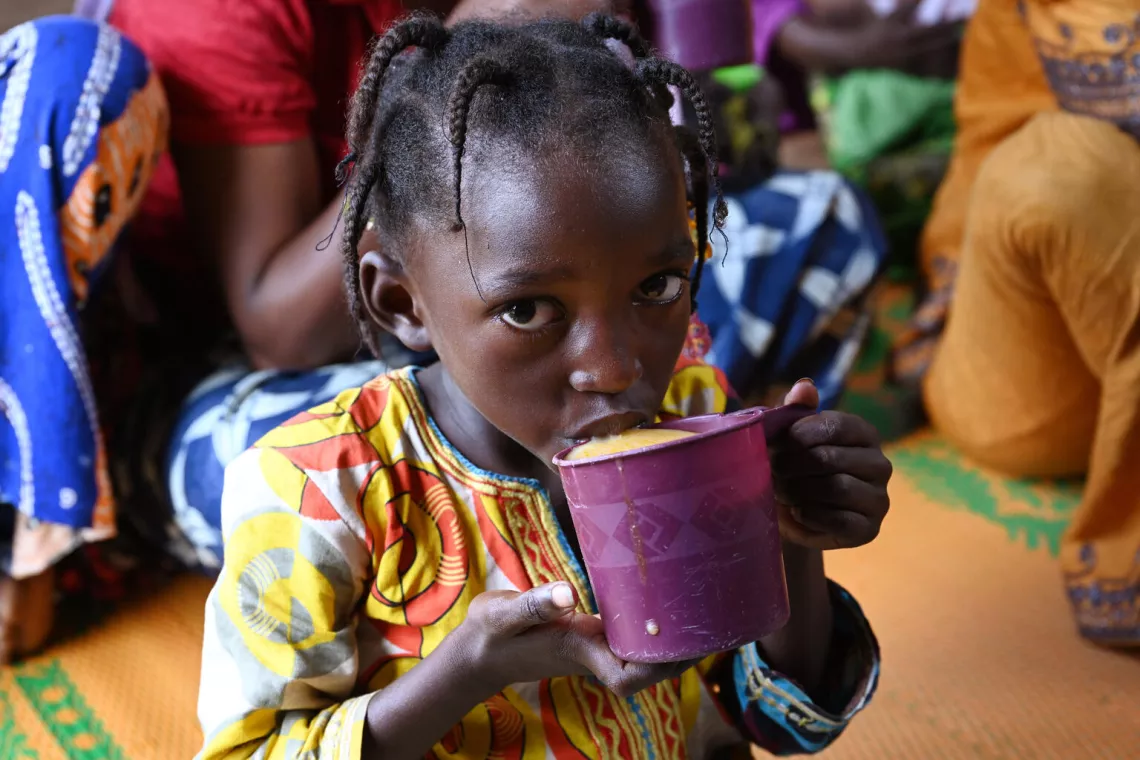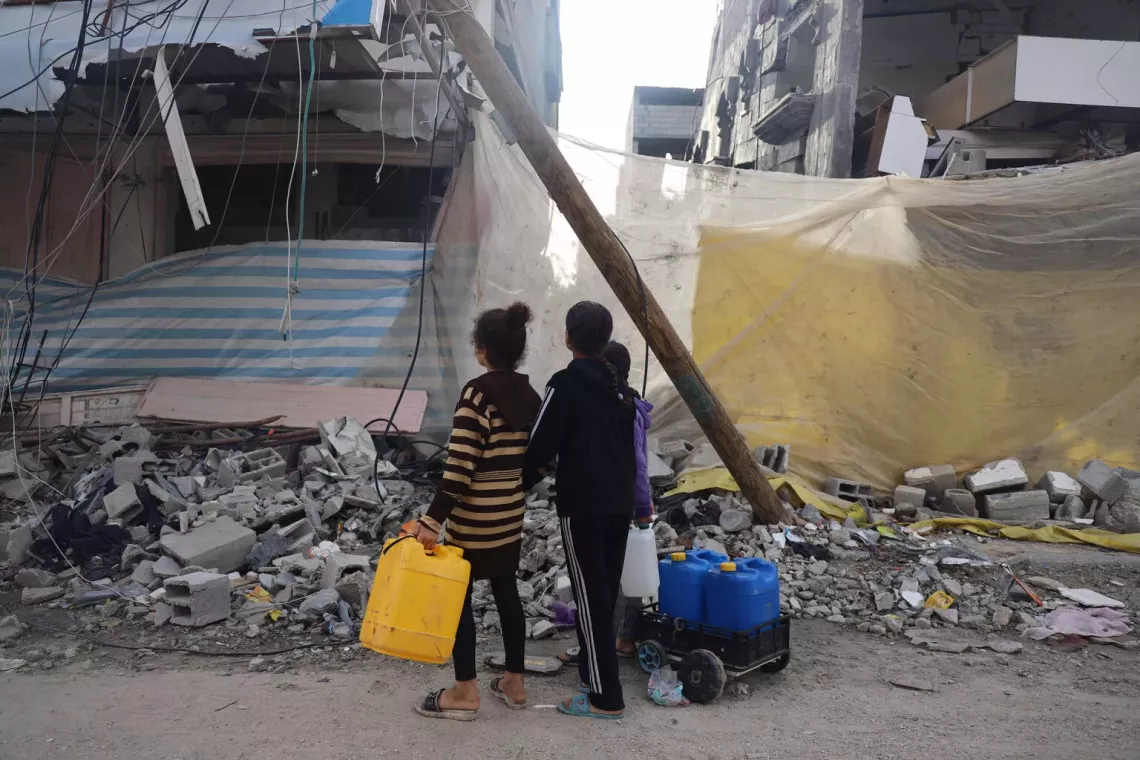Escalating conflicts, disasters, food insecurity, and disease outbreaks have combined to create unprecedented global humanitarian needs in 2024. From Haiti, to the State of Palestine and Sudan, grave violations, violence and devastated essential services are leaving millions of children at risk. Meanwhile, climate shocks, food insecurity, and disease outbreaks have left families from Afghanistan to Democratic Republic of the Congo to Myanmar reeling.
We know how to reach children at risk and in need of support. Whether it’s through pre-positioned life-saving emergency supplies, safe spaces, or providing psychosocial support, UNICEF is on the ground to assist the families in greatest need, wherever they are.
But even as the needs have soared, the funding situation is bleak. Here are 13 emergencies that must not be overlooked in 2024:
Afghanistan

Afghanistan is home to one of the most crushing humanitarian crises in the world. After decades of conflict, Afghans have been cut off from the global community, left to grapple with economic collapse, climate disasters and human rights violations. The protracted and complex nature of the crises in Afghanistan underscores how critical it is address acute humanitarian needs while simultaneously investing in basic services.
UNICEF, with help from its partners, is working to prevent the collapse of Afghanistan’s healthcare system. This includes paying salaries and providing essential supplies to thousands of health workers and treating children who are at risk of malnutrition. Additionally, UNICEF’s water, sanitation, and hygiene (WASH) programme is tackling big challenges with small but sustainable solutions. We install solar-powered water pumps that make clean water accessible to entire communities and keep water management safely in their hands.
Burkina Faso

More than 3 million children in Burkina Faso require humanitarian assistance against the backdrop of ongoing conflict and massive internal displacement. Burkina Faso is located in the Sahel region, which is embroiled in a multidimensional humanitarian crisis driven by spreading armed violence, demographic pressures, climate change and health and nutrition crises.
UNICEF continues to respond to the physical and psychosocial needs of children in Burkina Faso, including treating children with severe wasting – the most lethal form of undernutrition – delivering educational materials, such as individual school kits, and providing information on where to report exploitation and abuse safely.
Cameroon

Cameroon faces a complex mix of armed conflict, inter-communal violence, an influx of refugees from neighboring countries, disease outbreaks including cholera and measles, and seasonal flooding. The crisis is exacerbated by malnutrition, a rise in staple food prices, and the fact that more than one third of the population lives below the poverty line.
UNICEF supports the screening of children under 5 for malnutrition through a network of community health workers to assure early detection and referral of children with wasting. UNICEF is also working with partners to provide access to education out-of-school children.
Central African Republic

The Central African Republic is one of the toughest places in the world to be a child. Widespread violence and displacement continue throughout the country, leaving some 2.8 million people in need of humanitarian assistance. The crisis has been compounded by the escalating conflict in neighbouring Sudan and an influx of asylum seekers and returnees from Chad.
UNICEF continues to focus on improving access to quality of education for children in crisis-affected areas, such as providing temporary learning spaces, school-in-a-box kits and emergency education materials, as well as training for teachers and psycho-social support.
The places children usually go to for protection and support – including schools, hospitals and places of worship – are under attack by armed groups. Hundreds of schools are non-operational as a result of insecurity, lack of teachers and inaccessibility, leaving children even more vulnerable to exploitation and violence. More than anything, the children of Central African Republic desperately need security.
Chad

Conflict-induced displacements, a nutrition crisis, natural disasters resulting from climate change, epidemics, poverty, and political transition had already left families in Chad reeling. Now, an influx of refugees from neighbouring Sudan have created an even more volatile situation as already limited resources are becoming increasingly stretched.
UNICEF continues to reach children and caregivers with prevention and treatment of malnutrition, immunization campaigns, psychosocial support through child-friendly spaces and community talk groups. UNICEF is also helping vulnerable families gain access to safe drinking water, for example through the construction of solar-powered and climate resilient boreholes.
Democratic Republic of the Congo

Intensifying violence, massive displacement, and the proximity of armed groups to communities are leading to an alarming increase in cases of killing, maiming, and abduction of children in the Democratic Republic of the Congo. Almost 5 million people require assistance as armed conflicts and inter-communal clashes generate unprecedented humanitarian needs.
The crises are also having a significant impact on children’s education and overall well-being. The closure of many schools in the east of the country, for example, is exposing children to protection risks such as recruitment by armed groups and early marriage.
UNICEF continues to provide children with mental health and psychosocial support services and has assisted thousands of survivors of gender-based violence. UNICEF is also supporting children to access formal and non-formal education. We’re providing individual learning kits and maintaining routine and emergency vaccination campaigns to ensure immunization coverage of children.
Ethiopia

Overlapping hazards including conflict, severe drought, flooding, intercommunal violence and outbreaks of diseases have left more than 30 million people in Ethiopia – more than half of them children – in need of humanitarian assistance.
UNICEF is delivering life-saving support, including providing treatment for children with severe acute malnutrition and other essential health services. UNICEF is also reaching mothers with young children with key nutrition messages through community-based outreach workers and providing safe spaces for displaced children so they can play and be protected from harm. In addition, UNICEF provides access to safe drinking water and is installing sustainable, solar-powered water solutions that will build resilience and help mitigate the impacts of climate-induced shocks.
Haiti

Political turmoil, civil unrest, increasing armed violence, crippling poverty and natural disasters: A deadly combination of threats continues to jeopardize the survival, safety and well-being of Haiti’s children. Children are being injured or killed in the crossfire of fighting, some even on their way to school. Others are being forcibly recruited or are joining armed groups out of sheer desperation. Communities are being terrorized. Meanwhile, limited access to safe drinking water, affordable food, and basic education and health services, coupled with the resurgence of cholera and malnutrition, is pushing children and their families to breaking point.
Despite the extremely insecure and volatile environment, UNICEF is working with partners to step up efforts to protect children and families and provide the life-saving support they desperately need. This includes supporting nutrition and health services, responding to the cholera outbreak, promoting safe learning environments, providing psychosocial support and assisting with disaster recovery and preparedness.
We’re also prioritizing psychosocial support interventions for children, such as providing protection services to victims of gender-based violence, unaccompanied and separated children and those associated with armed groups, as well as strengthening community child protection networks.
Myanmar

Widespread conflict continues to have a devastating impact on children and their families in Myanmar. Grave child rights violations, mainly due to the indiscriminate use of heavy weapons, airstrikes, and explosive ordnance, continue to be reported. Attacks on schools and hospitals have continued at alarming levels. As a result, children and women are at increased risk of violence, exploitation and abuse. Millions of children and adolescents are being deprived of their right to education because their safe access to education has been disrupted.
UNICEF is providing life-saving child protection services for children and families, including case management, psychosocial support and explosive ordinance risk education. We’re also supporting the continued access of crisis-affected children to safe learning environments, including those affected by Cyclone Mocha – one of the strongest cyclones ever recorded in Myanmar, which left a trail of devastation after making landfall in May 2023.
Somalia

A once-in-a-century drought in 2023 was followed by El Niño-induced flooding, while displacement, ongoing conflict, and high food prices have combined to leave millions of children in Somalia in need of urgent assistance.
UNICEF and partners continue to reach hundreds of thousands of children with life-saving treatment services for severe wasting. We’re also providing internally displaced persons and vulnerable host communities with life-saving water and sanitation services, including water source chlorination and hygiene promotion.
South Sudan

South Sudan, the world’s youngest country, has faced multiple challenges since its creation in 2011, including conflict, persistent and devastating flooding, disease outbreaks, and food insecurity. The dire situation for the country’s families has been compounded by the crisis in neighbouring Sudan, which has sparked an influx of refugees and returnees across multiple points of entry along the border between the two countries. Meanwhile, millions of children remain out of school in South Sudan, putting at risk their futures and the future of the country.
UNICEF is working with partners to support both emergency and routine health services, including reaching millions of children under 6 with measles vaccinations. We’re also strengthening access to quality education for children, by training teachers, constructing and rehabilitating classrooms, providing teaching and learning materials, and organizing back-to-school campaigns.
State of Palestine

Even before the escalation of violence in October 2023, children in the State of Palestine had grown up under the shadow of recurrent violence and crushing poverty. But the hostilities in the Gaza Strip in late 2023 have had a catastrophic impact on children and families, with children dying at an alarming rate and more than 1.7 million people displaced. Families have been left with inadequate access to water, food, fuel and medicine. Their homes have been destroyed; their families torn apart.
Given conflict injuries, the precarious water situation, overcrowding and the risk of disease outbreaks, the priority areas are WASH, health, and child protection services. UNICEF is also scaling up nutritional screening and treatment and recreational and learning activities for conflict-affected children.
Sudan

An outbreak of conflict in Sudan in 2023 created one of the largest child displacement crises in the world. More than 3 million children were forced to flee widespread violence in search of safety, food, shelter and health care.
Even before the conflict, humanitarian needs across Sudan had reached record levels. But as fighting continued in 2023, the already dire situation reached catastrophic levels. Access to food, safe water, electricity and telecommunications are unreliable, and unaffordable.
Despite significant challenges, UNICEF and partners have reached millions of children and families with life-saving health and nutrition care, safe drinking water, and psychosocial counselling, learning, and protection support, including through the establishment of hundreds of safe spaces.










